Iran Discharging Oil Cargo At Syria’s Baniyas Port – UANI
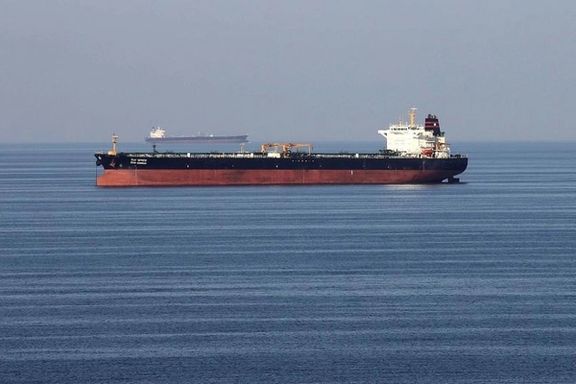
Advocacy group United Against Nuclear Iran (UANI) says two Iranian tankers are unloading their cargoes at the Baniyas Single Buoy Mooring (SBM) and a third is on its way to the port.

Advocacy group United Against Nuclear Iran (UANI) says two Iranian tankers are unloading their cargoes at the Baniyas Single Buoy Mooring (SBM) and a third is on its way to the port.
UANI Chief of Staff Claire Jungman published the photo of the tankers in a tweet on Friday explaining that Iranian tankers Daran and Golroo are discharging at the Baniyas SBM, while Arman 114 is engaged in an STS transfer with Traden, which is sailing under the flag of Cameroon after repairs in Turkey earlier this year.
In order to avoid detection of the destination of its cargo, Iran usually uses ship-to-ship transfers, in which the vessels turn off their transponders at the sea and secretly transfer oil cargo.
According to data by the UANI, Syria is the second largest importer of the Iranian oil after China. The Islamic Republic delivered more than 111,000 barrels of oil per day to Syria in the previous month.
It is not clear whether or how Iran is being paid for the shipments, whose value only for the month of May is over $400 million with current oil prices.
Earlier in the month, UANI called on six Chinese banks to end all financial transactions with Iran.
As part of ‘maximum pressure’ sanctions introduced in 2018 on leaving the 2015 Iran nuclear deal, US President Donald Trump signed an executive order threatening punitive US action against any third party dealing with Iran’s financial sector.

Data released by Tehran show the economy has grown more than 4 percent over the last year, driven by high oil prices and loose enforcement of U.S. sanctions.
This relatively strong economic growth can partially explain Tehran’s current stonewalling of nuclear negotiations with the Biden administration, as Supreme Leader Ali Khamenei likely does not feel massive pressure to secure sanctions relief by striking a deal. If Washington were to reinvigorate its sanctions enforcement, however, it could reverse the Islamic Republic’s economic fortunes, stoke political instability within Iran, and pressure Khamenei to surrender.
According to Iran’s Statistics Center, the country’s GDP grew by 4.3 percent during the Persian calendar year 1400 (April 2021 to March 2022). The growth rate in the previous year was one percent. Almost all major sectors of the economy grew. Oil and gas saw the fastest growth rate, at 9.7 percent. The service sector, the largest sector of Iran’s economy, grew by 4.5 percent after having shrunk by 1.3 percent the previous year. This growth, however, does not mean that the economy is doing well. The real GDP is still below its March 2018 level, the point-to-point inflation was 52.5 percent in June, and the country faces daily protests and strikes over low wages and high inflation.
Several factors explain this higher growth. First, since taking office in January 2021, President Joe Biden has abandoned his predecessor’s policy of “maximum pressure” against Iran, leading to loose enforcement of U.S. sanctions against the Islamic Republic. Iran exported $48 billion worth of non-oil goods during the Persian year of 1400, the most in the country’s history. This trend has continued throughout the first two months of 1401 (April and May 2022), during which time Tehran exported 40 percent more oil year-over-year.
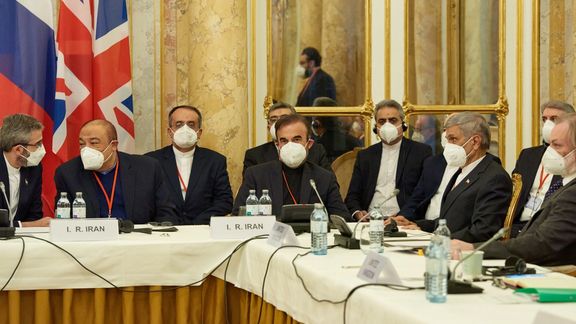
Meanwhile, Iran’s economy has benefited from higher prices of commodities, particularly oil and oil-based goods such as petrochemicals. The Islamic Republic also managed to replace some imported goods by expanding domestic production, in turn boosting Iran’s manufacturing and mining sectors. Finally, the removal of pandemic-related restrictions, combined with public optimism about reaching a deal with the United States to end sanctions, contributed to the growth in the service sector.
Iran’s renewed economic growth likely helps explain why Khamenei is in no rush to reach a nuclear deal with Biden. Loose U.S. sanctions enforcement has allowed Khamenei to reap economic benefits while expanding his nuclear program and eroding Washington’s leverage over Tehran.
Fortunately for the United States, however, Iran’s economy — and thus Khamenei’s negotiating position — remains fragile. If oil prices remain high and U.S. sanctions enforcement remains lackluster, the Islamic Republic could probably achieve 3to 5 percent growth this year. But a U.S. return to “maximum pressure” would likely see Iran’s economy return to meager or negative growth rates.
One sign of this fragility is that Iranian economic growth decelerated toward the end of the year, with GDP growing by just 2.3 percent during the last quarter (spring of 2022) compared to 6.9 percent during the first quarter (winter of 2021). That trend held true across most economic sectors. For example, whereas the oil and gas sector grew by 27.4 percent in the first quarter, its growth rate dropped to 0.5 percent in the fourth quarter. Likewise, the real estate sector grew 15.3 percent in the first quarter but shrank by 3.4 percent in the last quarter.
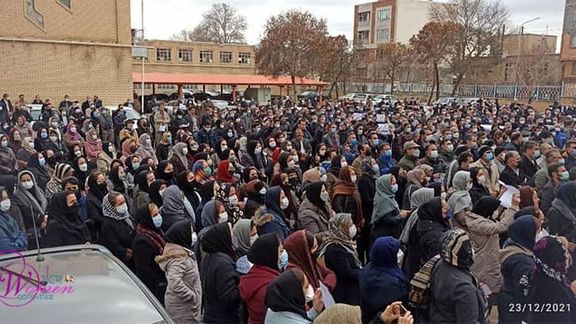
Moreover, the Islamic Republic has suffered from high inflation since late 2018, reducing purchasing power. This means that domestic consumption and demand are fragile. If the Biden administration tightens sanctions enforcement, consumer and investor pessimism will push down investment and consumption. The result will be a slowdown in economic activity and lower or negative GDP growth.
That economic downturn could exacerbate Iran’s ongoing socio-political instability, toppling his regime or increasing Khamenei’s incentive to reach a deal with Washington. Since 2017, the country has faced two waves of massive protests. In November 2019, the regime killed at least 1,500 protesters in less than a week to survive the most widespread protests of its history. Government restrictions and self-imposed isolation during COVID-19 slowed down the protests, but as those impediments faded, protests and worker strikes began again in 2021 and gained momentum in 2022. The protests and strikes now occurring daily across Iran reflect deep societal discontent, which can both signal and create economic troubles.
If the Biden administration continues with the status quo, it can expect Tehran to continue stonewalling, eliminating any chance of reaching an acceptable nuclear deal. Conversely, reviving maximum pressure could force Khamenei to play ball. With the Islamic Republic edging closer and closer toward a nuclear weapon, Biden doesn’t have any time
Saeed Ghasseminejad, who contributed this opinion article is a senior advisor on Iran and financial economics at the Foundation for Defense of Democracies (FDD), where he contributes to FDD’s Iran Program and Center on Economic and Financial Power (CEFP). Follow Saeed on Twitter @SGhasseminejad. FDD is a Washington, DC-based, non-partisan research institute focusing on national security and foreign policy.
The opinions expressed by the author are not necessarily the views of Iran International.
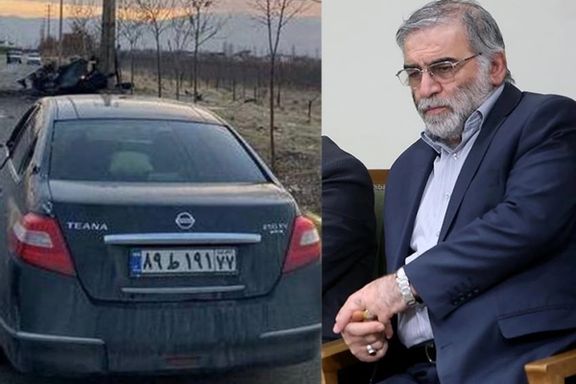
One of the suspects who was arrested in relation to the assassination of Iranian nuclear scientist Mohsen Fakhrizadeh has been freed on a bail of 250 billion rials (over $830 thousand).
Kurdish human rights group Hengaw said on Friday that Jamal Abdollahi, who is accused of helping the perpetrators in the assassination in November 2020 to flee Iran, was "temporarily" released on Thursday after 14 months of imprisonment in one of the security detention centers of the Revolutionary Guard in Tehran.
He was arrested along with his brother in April 2021 and was denied access to a lawyer during the past 14 months. His brother Kamal is still behind bars.
They are accused of helping some of the perpetrators escape through the border near the city of Baneh in Kurdistan province, but they were never tried over the charges.
His release comes as the chief of IRGC’s intelligence Hossein Ta’eb was replaced by Mohammad Kazemi, another figure in the outfit, reportedly due to long-simmering opposition by other top security figures.
Iran blames Israel for the assassination of Fakhrizadeh, said to had been Iran’s top nuclear man, in a highly complicated operation east of the capital Tehran involving a remote-controlled one-ton automated weapon that had been smuggled into the country in pieces.
Iran has also accused Israel of sabotage operations against its nuclear facilities including an explosion in April 2021 that inflicted major damage to the Natanz uranium enrichment site.
Israel has never officially taken responsibility for any of these assassinations and sabotage operations but also has never denied involvement.
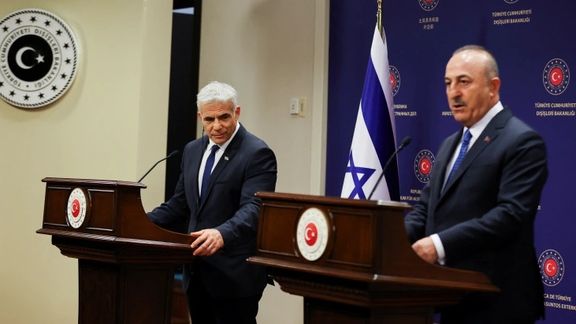
Iran’s foreign ministry says Israel has waged a psychological operation and a smear campaign against Iran to sabotage relations between Tehran and Ankara.
Speaking to reporters in Tehran Friday, the ministry spokesman Saeed Khatibzadeh rejected Israeli Foreign Minister Yair Lapid’s allegations about Iranian plots to attack Israeli citizens in Turkey. He described Israeli accusations as a “scenario to destroy relations between the two Muslim countries.”
"Our neighbor Turkey is well aware of the baseless allegations made by the deceitful, terrorist Zionist regime and we expect them not to remain silent about such divisive allegations," he added.
Commenting on Ankara’s announcement Thursday that its National Intelligence Organization (MIT) thwarted a planned attack against Israeli diplomats and tourists in Istanbul, Khatibzadeh also alleged that Tel Aviv is trying to divert Turkish and regional public opinion from the Palestinian cause and its own actions against Palestinians.
The MIT said Thursday that it detained eight suspects including five Iranian nationals and three others allegedly working for an Iranian intelligence cell working to assassinate Israeli citizens on Turkish soil.
In a joint press conference with his Turkish counterpart in Ankara on Thursday a few hours after the announcement, Lapid accused Iran of planning to attack Israelis in Turkey and thanked the Turkish government for taking action to foil the plots.
At the same press conference, the Turkish foreign minister Mevlüt Çavuşoğlu stressed Ankara’s security pact with Israel, contacts with his Israeli counterpart over terrorist threats against Israeli tourist, and said Turkey would “never allow such revenge and terror attacks against Israelis” on its soil.
“Necessary messages have already been given [to those who are responsible],” he added in a clear reference to Tehran.
“About a week ago they launched a psychological operation using false and orchestrated information to engage the media in fictitious scenarios to prepare the ground for the Israeli Foreign Minister's smear campaign," Khatibzadeh told reporters without making any mention of Turkish media reports about the arrests made by the MIT.
“Iran’s response to the Israeli regime’s assassination and sabotage will always be definite, authoritative and without threatening the security of ordinary citizens and the security of other countries,” Khatibzadeh insisted.
Ankara has canceled a planned visit by the Iranian foreign minister Hossein Amir-Abdollahian’s visit to Ankara in the past few days, apparently due to its frustration with Tehran’s alleged terrorist operations on its soil.
A further date for Amir-Abdollahian’s visit has not yet been announced. An informed Israeli source told Iran International’s correspondent in Tel Aviv that this was the second time in the past week that Ankara canceled the Iranian foreign minister’s visit.
Tel Aviv’s concerns over attacks on its citizens in Turkey have considerably increased following the assassination of Colonel Hassan Sayyad-Khodaei in Tehran last month.
Sayyad-Khodaei, the acting commander of the elite Unit 840 of the IRGC’s Qods (Quds) Force, was shot dead behind the wheel of his car outside his home May 22 by two gunmen who fled the scene on a motorbike.
A European security source last month told Iran International that Sayyad-Khodaei had been in charge of planning terrorist operations outside Iran, including attacks in India, Taiwan, Cyprus and Georgia. Suspicions for his assassination fell on Israel and according to some reports, Israeli officials told the United States that they had targeted Sayyad-Khodaei.
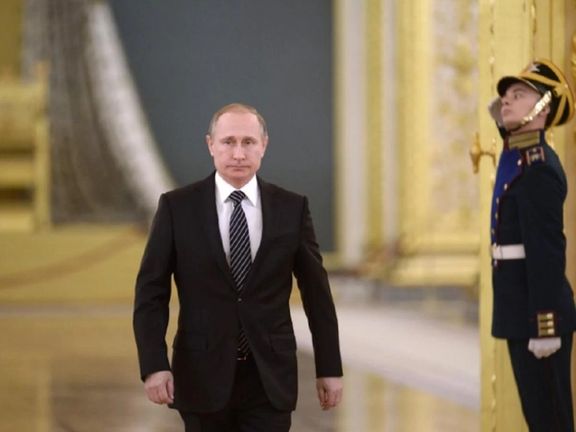
Kremlin spokesman Dmitry Peskov says Russian President Vladimir Putin will certainly visit Iran at some point, but the exact date of this visit is yet unknown.
According to TASS, Peskov made the remarks on Friday, a day after Iranian Foreign Minister Hossein Amir-Abdollahian expressed hope that the Iran-Russia-Turkey summit will eventually convene in Tehran.
"He will certainly [go there] over time, but exact dates are yet to be determined," the spokesman said, when asked to comment on the possibility of Putin visiting Iran and participating in a summit in the framework of Astana talks over the conflict in Syria.
Plans to hold such a meeting in Tehran were announced several times before the covid-19 pandemic hit the world, but the event had to be postponed many times since.
After the 16th meeting of the Astana process in Kazakhstan's capital Nur Sultan in July 2021, Turkey, Russia and Iran pledged to maintain cooperation in Syria to bring the warring sides together to find a permanent solution to the decade-long war.
Initiated by Turkey, Iran and Russia, the Astana meeting is focused on the constitutional system, political transition, security and resettlement. The first Astana meeting was held in Turkey in January 2017 to facilitate United Nations-sponsored peace talks in Geneva.
Russian Foreign Minister Sergei Lavrov was in Tehran on Wednesday and Thursday for an official visit, aimed at boosting trade and energy cooperation as the two countries grapple with Western economic sanctions.
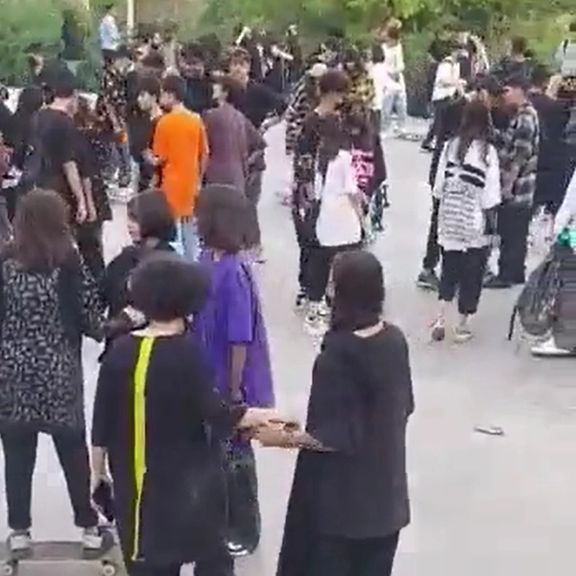
The governor of the southwestern city of Shiraz says several people have been arrested following the release of a video showing a gathering of teenagers who were not observing compulsory hijab.
The video that went viral on Thursday showed dozens of teenage boys and girls gathered in one of Shiraz's main streets. Many of the teenage girls were not wearing headscarves as is mandatory for girls over the age of nine.
The city’s governor Lotfollah Sheibani called it a "norm-breaking rally," adding that as soon as they were informed about the gathering, the police, in coordination with the judiciary, took action to identify and detain the organizers. "So far, 10 people who organized the rally have been arrested."
However, a few hours later, Fars News Agency, affiliated with the Revolutionary Guard, quoted the Chief Justice of Fars province as saying that only "five of the main organizers of the ceremony were arrested, and none of the participating teenagers are detained."
Recently, Iran’s morality police arrested 120 people in a nature tour in the forests of the Caspian Sea area for flouting their hijab, dancing together, and drinking alcohol.
Since hijab became compulsory in Iran, within a couple of years from the establishment Islamic Republic in 1979, many women have been resisting the prescribed standards of hijab promoted by the state and refuse to accept it even at the cost of being arrested, fined or even lashed.